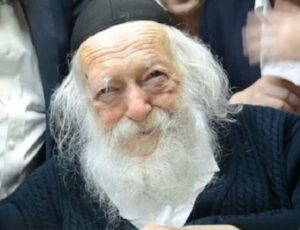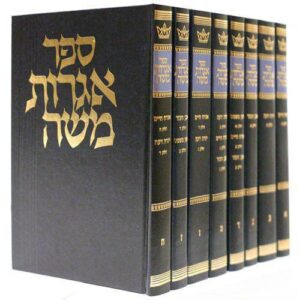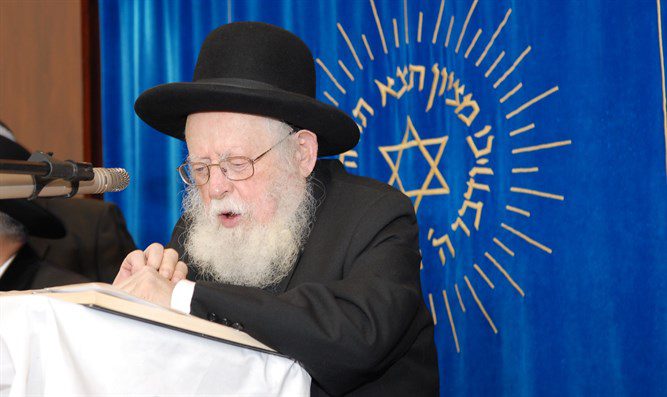Is Aliyah a Torah Commandment?
by Tzvi Fishman
The first Chief Rabbi of Israel, HaRav Avraham Yitzhak HaKohen Kook, received a letter asking if it was a mitzvah to settle in the Land of Israel. Rabbi Kook answered, “I am amazed at the question. How can one possibly have a doubt about this fundamental principle of our faith? We plainly see the immeasurable devotion to Eretz Yisrael, to its settlement, its acquisition, and its building, throughout all of the Torah, the Prophets, and the Oral Torah.” Rabbi Kook continued his lengthy 24-page response by citing hundreds of verses from the Torah, Scriptures, and the Talmud expressing the Jewish People’s eternal bond and commitment to Eretz Yisrael (“Hazone HaGeula,” Pgs. 10-34).
More recently, a young Torah student from Lakewood who made Aliyah told the revered Torah authority, HaRav Chaim Kanievsky of Bnei Brak, that in America, many people maintain that a Jew should not move to Israel until the Mashiach arrives.
 The reply of the elderly Sage was filmed. “G-d forbid,” HaRav Kanievski answered. “It is a mitzvah of the Torah to make Aliyah,” (The video can be seen on the website, naavakodesh.org).
The reply of the elderly Sage was filmed. “G-d forbid,” HaRav Kanievski answered. “It is a mitzvah of the Torah to make Aliyah,” (The video can be seen on the website, naavakodesh.org).
Today, some 100 years after Rabbi Kook wrote his letter, for many Jews outside of the Land of Israel, there still exists a question concerning a Jew’s obligation to live in the Chosen Land. Many Orthodox Jews cite a ruling of Rabbi Moshe Feinstein as the halachic reason that they don’t come on Aliyah.
Rabbi Feinstein, who lived in New York, was asked if aliyah to Eretz Yisrael was a mitzvah of the Torah, as stated by the Ramban, or a mitzvah that isn’t obligatory in our times, as a Tosefot in the name of R. Haim HaCohen implies (Ketubot 110, considered to have been recorded by a mistaken student). Rabbi Feinstein answered that indeed it is a mitzvah from the Torah, as the Ramban wrote, and about which most Torah authorities, both Rishonim and Achronim, agreed (See the Pitchei Tshuva to the Shulchan Aruch, Even HaEzer, Section 75:6), but that it was, in his opinion, a voluntary mitzvah which wasn’t obligatory (Igrot Moshe, Even HaEzer, 102).
 He compared it to the Torah commandment of tzitzit, which requires putting tzitzit on a garment that you wear if it has four corners. But if you don’t choose to wear such a garment, you don’t have to perform the commandment of tzitzit.
He compared it to the Torah commandment of tzitzit, which requires putting tzitzit on a garment that you wear if it has four corners. But if you don’t choose to wear such a garment, you don’t have to perform the commandment of tzitzit.
This question is explored in a wonderful translation by Rabbi Moshe Lichtman of Rabbi Tzvi Glatt’s book “Rise From the Dust” (“M’Afar Kumi”). The book is an in-depth study of the mitzvah of aliyah and settling the Land of Israel. The main topic analyzed is this very question, whether the mitzvah of aliyah is obligatory in our times. Rabbi Glatt, may Hashem revenge his blood, was murdered by an Arab terrorist in Hevron. In his scholarly treatise, he clearly demonstrates that aliyah is indeed a Torah mitzvah beholden on every Jew at all times, as the Ramban and a long list of eminent Halachic authorities confirm.
Included in the book, “Rise From the Dust” [https://toratzion.com/] is a response written by Israel’s former Chief Rabbi, the revered Rabbi Avraham Shapira, of blessed memory, Head of the High Rabbinical Court and Rosh Yeshiva of the Mercaz HaRav Yeshiva in Jerusalem. He strongly disagrees with Rabbi Feinstein, questioning the whole idea of a “voluntary” mitzvah. Here are some excerpts of his halachic essay which appear in Rabbi Glatt’s book:
Rabbi Shapira writes:
“The implication of this new concept – a ‘voluntary mitzvah’ – is that one is not obligated to fulfill it, but if one does, he has performed a mitzvah. This seems self-contradictory. On a simple level, a Torah commandment, counted as one of the 613, is not dependent on man’s desire – if he wants to fulfill it, he will, and if not, he won’t. After all, this contradicts the whole idea of a mitzvah, which is a command from Hashem, may He be blessed. How can one say that G-d leaves the fulfillment of His decree to man’s discretion? We assume that G-d did not give us the mitzvot in order to derive pleasure from them. Rashi explains in Tractate Rosh HaShanah (28a), ‘Rather, they are a yoke upon man’s neck, to fulfill Hashem’s desire.’ What kind of a yoke is it if one can decide whether to fulfill them or ignore them?
“This (the mitzvah of aliyah) is different from [Rabbi Moshe Feinstein’s example of] tzitzit, which is not an obligatory mitzvah, but one that depends on man’s will. Tzitzit depends on a person’s desire to wear a four-cornered garment, and the Torah does not obligate one to wear such a garment. However, once a person wears a four-cornered garment, he is obligated to place tzitzit on its corners, and that is not dependent on his desire at all. Once he wears a garment that the Torah speaks of, he cannot evade the mitzvah. Why, then, would we say that there is a mitzvah to make aliyah, but that it is up to man whether he wants to fulfill it or not? It appears that we do not find another mitzvah like this in the count of the 613 commandments….
“All this proves that none of the mitzvot, especially those included in the 613, depend on man’s desire. Rather, we force him to do them. Only those that Scripture designate as being voluntary depend on a person’s willingness [to perform them], for the verses teach us that these mitzvot are essentially not part of the 613. Rather, they are good practices, fitting to do, and good advice. All this is obvious, for it is illogical to say that the Torah establishes a mitzvah and man is permitted to say, ‘I am not interested….’
“Nevertheless, it is clear that when there is an explicit mitzvah in the Torah – one of the positive commandments included in the 613 – one cannot say that it depends on whether or not a person wants to [fulfill it]. Therefore, according to the Ramban, who holds that dwelling in Eretz Yisrael is a positive commandment counted as one of the 613, one cannot say that fulfilling it depends on man’s desire. Rather, it is absolutely obligatory.
“The Meiri writes in Bava Kama (80), ‘Every Jew is commanded to establish his dwelling in Eretz Yisrael.’ In addition, the Ramban writes in Bava Batra (24) that the law of [designating open areas for the purpose of] beautifying a city applies only in Eretz Yisrael. Regarding Chutz LaAretz, however, he says, ‘If only [those lands] would be despicable in the eyes of [the Jews] who dwell there!’
“Why, then, did the Gedolim (Torah Giants) of previous generations neglect this mitzvah? ‘Teshuvot Maharam’ and ‘Terumat HaDeshen’ (two leading Torah authorities) explain that [those generations] were under duress and unable to dwell in Eretz Yisrael because of difficult conditions, etc… I would add that this is not a regular case of compulsion, in the sense of ‘The All-merciful exempts one who is forced [to sin].’ Rather, the mitzvah itself is suspended when dwelling in the Land entails hardship. Similarly, we find that one who experiences discomfort sitting in a sukkah is exempt from the mitzvah, because of [the rule] “You shall sit [in the sukkah] as you dwell [in your home].” Chazal determined that the definition of “dwelling” is when one is comfortable and has space, not when one is in pain. Dwelling somewhere in pain is not considered dwelling. The same applies to going up to live in Eretz Yisrael. One who finds his [new] accommodations distressful, relative to what he had in Chutz LaAretz, does not [fulfill] the mitzvah of You shall dwell therein (BeMidbar 33:53). Thus, any situation in which one would be exempt from sitting in a sukkah, one would also be exempt from dwelling in Eretz Yisrael….
“Now, if the definition of ‘discomfort’ [with respect to aliyah] is identical to its definition with respect to sukkah, [we can deduce the following]. Obviously, dwelling in a sukkah, a temporary structure, is less comfortable than dwelling in a permanent home. Nonetheless, that certainly does not constitute ‘pain.’ One is exempt from the mitzvah of sukkah only when dwelling there is painful, relative to the type of dwelling it is, and this requires serious evaluation. [So too, one is not exempt from dwelling in Eretz Yisrael just because it is easier to live in Chutz LaAretz.] The great Torah Scholars of [previous] generations determined that it would be [genuinely] painful for them to dwell in the Land, and they were [therefore] exempt from doing so. Today, however, when the Land of Israel is [governed by] the State of Israel, and enjoys [modern] economic conditions, the level of ‘discomfort’ is very mild – especially for singles who are free from the yoke of family – thus everyone is undoubtedly assumed to be obligated in the mitzvah. One would require the judgment of great Torah Scholars to determine that he is exempt from performing the mitzvah. In any event, it is clear that the concept of a mitzvah being dependent on each person’s discretion – whether he obeys the mitzvah or chooses not to – this is incomprehensible.”






